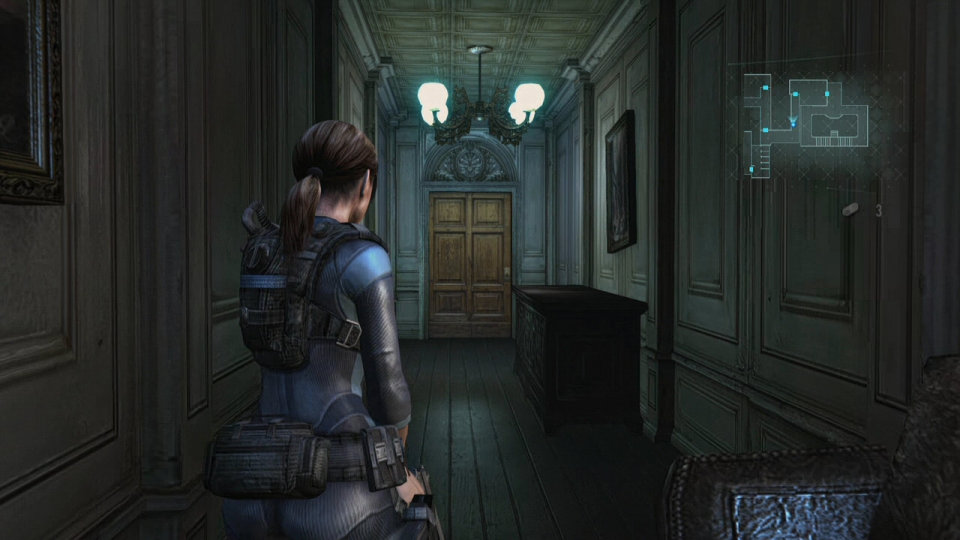
This is what Resident Evil is all about: creepy setting, narrow corridors, and unknowns lurking behind every door.
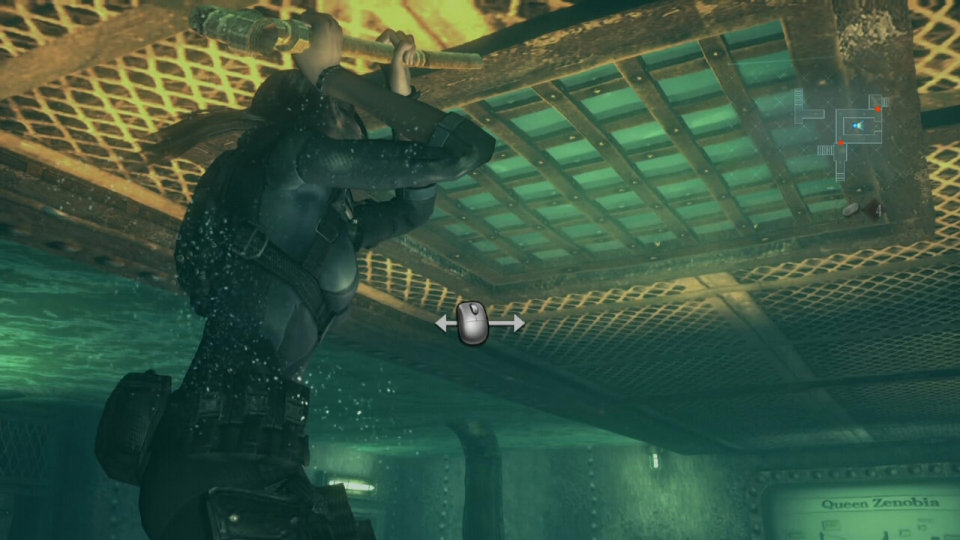
Revelations utilizes its setting by sending the player into flooded regions of the ship to add variety and diversity but wisely keeps the completely submerged sequences short and few so they don’t wear out their welcome.
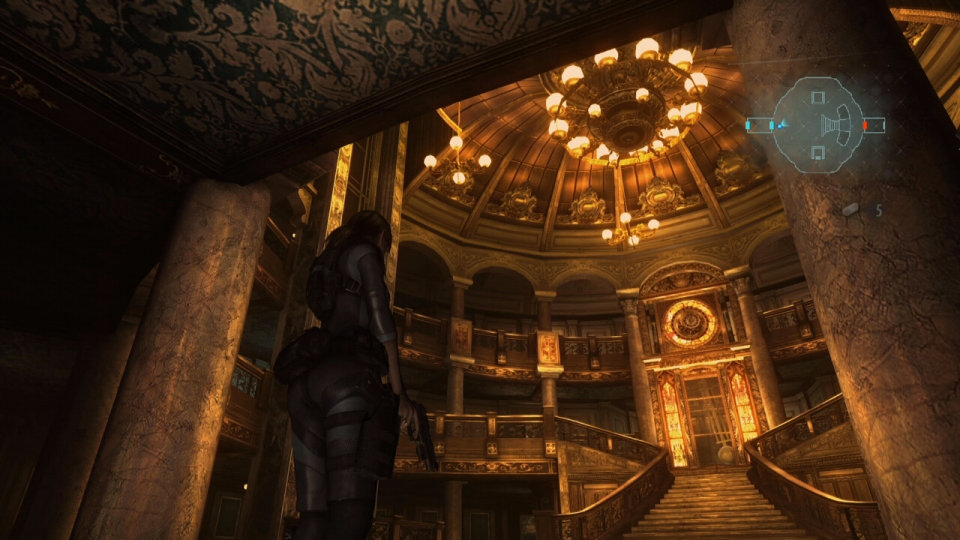
Only on a cruise ship can you have mansion-like corridors, an opera house inspired main hall, a casino, and a dirty gritty engine room all right next to each other with none of it seeming out of place.
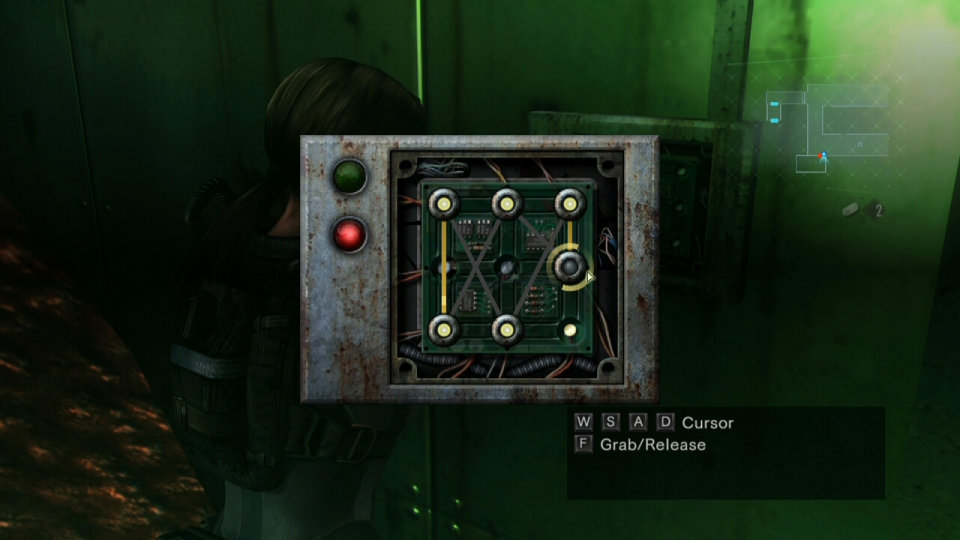
It is nice having the player participate in opening the electronically locked doors (of which there are few) as long as the minigames remain quick, easy, and never become tedious.
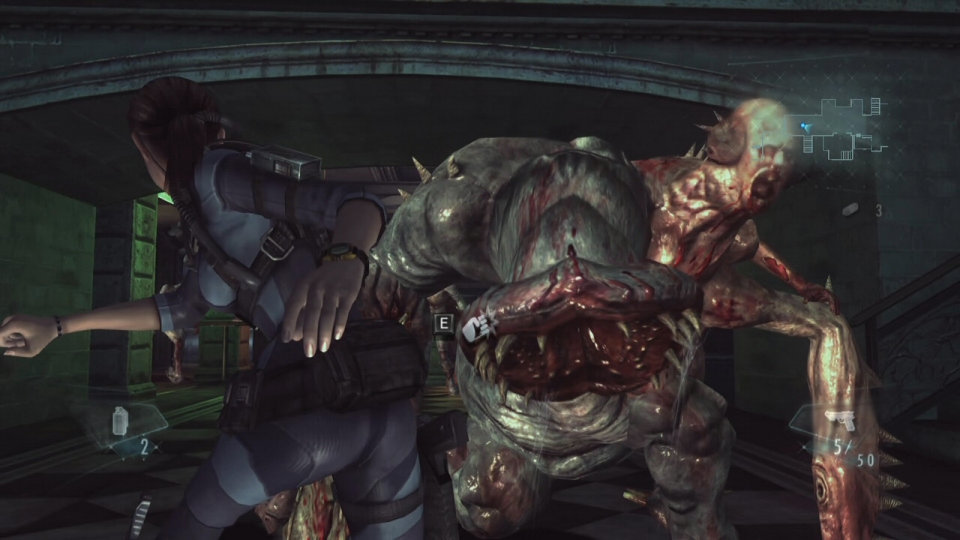
When an enemy is stunned, pressing the action button will initiate an unarmed melee attack. Holding the button down will charge up the attack, increasing the damage.
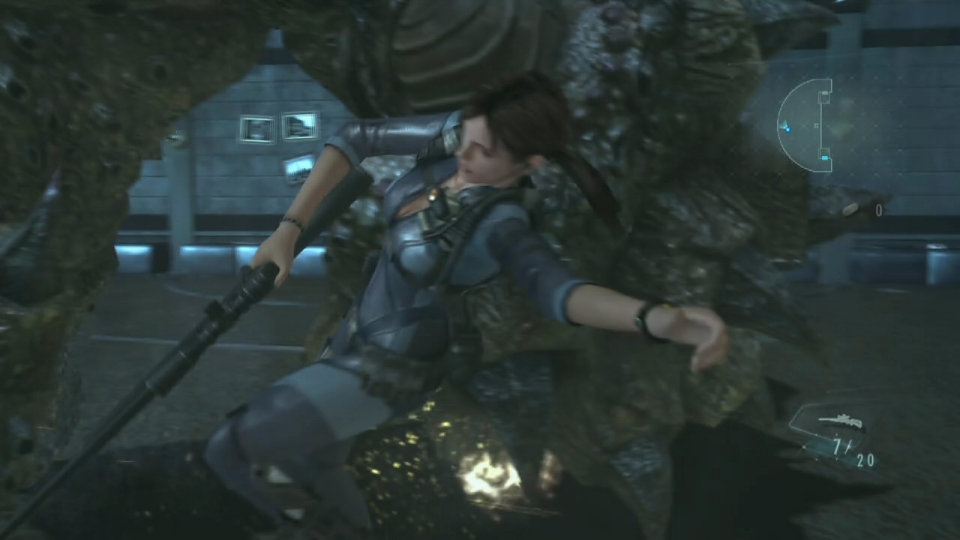
Pressing forward or quick turn at the right moment will allow the player to dodge out of the way of an incoming attack. What makes it particularly nice, though, is the choice of whether to dodge forward or backward which affects where you end up relative to the enemy.
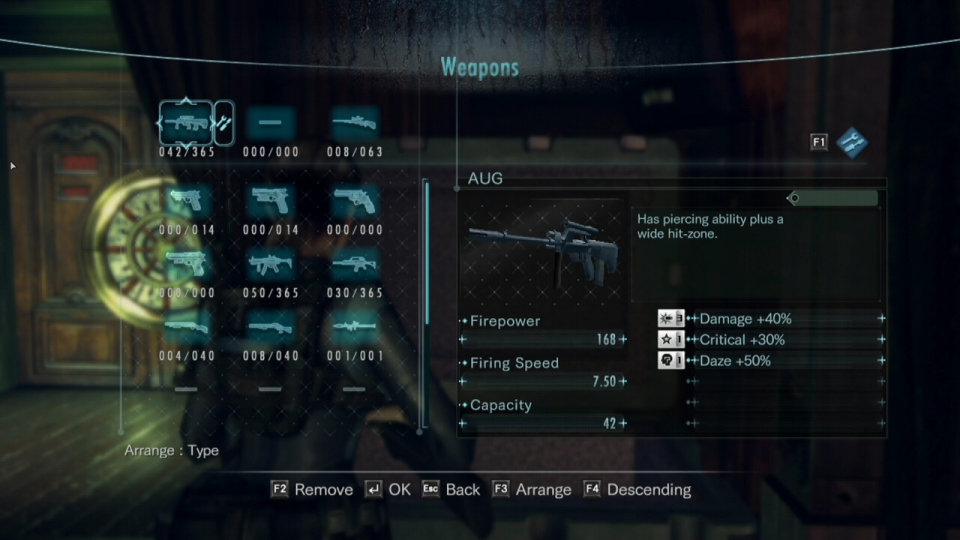
The trademark Resident Evil crates return solely to upgrade and store extra guns ... but not extra herbs nor ammo.
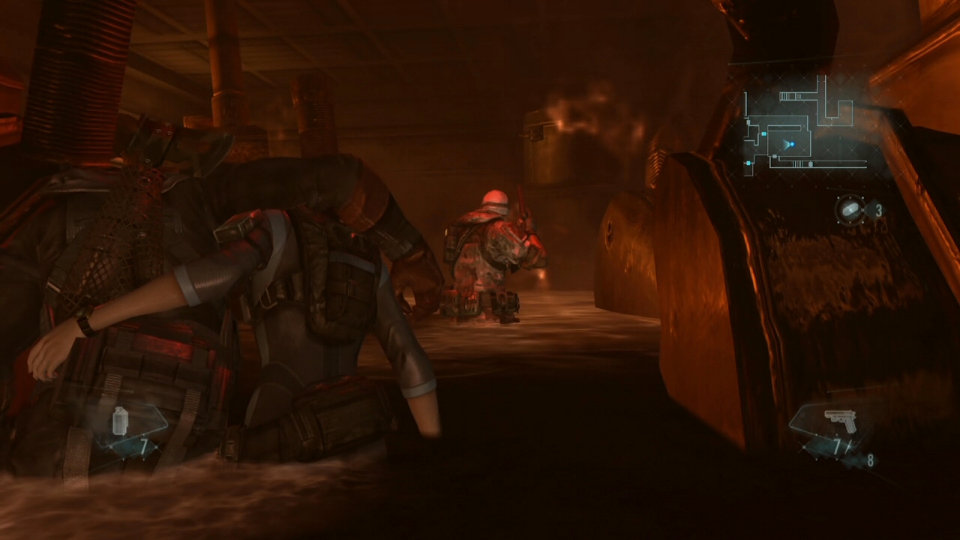
Revelations is at its strongest when it sticks to the Queen Zenobia where the most compelling conflict takes place. Every time it cut away to some other part of the world with other characters for tangential information, I just wanted to get back to Jill and Parker in the middle of the Mediterranean.
Review by Jay Wilson Playing Resident Evil: Revelations, I’m reminded of the 1925 film Phantom of the Opera starring Lon Chaney Sr. The film climaxes with the cornered phantom raising a menacing fist into the air, and the angry mob jumps back in fear of whatever hidden terror lies within his grasp. Slowly he opens his empty hand, revealing the whole Opera Ghost legend to be nothing more than smoke and mirrors. And as the swarm closes in on the doomed antagonist, we realize the film has done the exact same thing to us—strung us along with style and flair from the very beginning with nothing substantive up its sleeve—but somehow we, the audience, find the deception charming and view the phantom’s demise as all the more tragic. Likewise, Revelations holds absolutely nothing in its hand, but unlike Phantom of the Opera it gets nothing but contempt. The game erroneously equates revelations with plot twists and proceeds to saturate the already convoluted Res Evil narrative with fanfiction caliber non-binding toothless surprises. Morgan, head of the FBC (the bad anti-bioterror organization), conspires to give biological weapons to bio-terrorists, Veltro, to get more funding. O’Brian of the BSAA (a good anti-bioterror organization), conspires against his own people (including Jill Valentine and Chris Redfield among others) and puts them in danger to expose the mole in his organization and to uncover Morgan and FBC’s conspiracy. Both the FBC and BSAA have their own undercover operative in Jessica and Raymond who conspire together against their own organizations. And Veltro, you know the bad guys who make a single appearance in a last minute cameo, conspire to betray Morgan and the FBC for betraying them. Phantom of the Opera worked because, among other reasons, it was smart enough to know that once you reveal an empty hand ... thrusting your fist into the air a second time doesn’t fool anyone. Thrusting your fist into the air five more times is just fucking retarded. And with each and every new plot twist, the game manages to undermine quite literally every single scenario and action the player takes. Jill Valentine and her new sidekick Parker go to a derelict cruise ship in the middle of the Mediterranean in search of Chris Redfield. But the very next chapter hands us control of Chris Redfield on a snowy mountaintop on order from the same people who sent Jill out on, ahem, “faulty intelligence.” Now, naturally one will think they’re playing a flashback that leads up to Chris’ disappearance, but no. At the end of the sequence, Chris and his new sidekick, Jessica, learn Jill and Parker went missing and set out to find them effectively rendering either the mountain sequence or derelict ship sequence completely pointless (or possibly both). Now, this is obviously supposed to be a mystery. But the misdirections in a mystery arise organically from insufficient information. Take your typical murder mystery. The detective finds a fingerprint. This points to a suspect. Naturally the detective (and the narrative) will pursue said suspect until another clue comes along and paints a bigger picture, usually acquitting the original suspect and casting suspicion upon someone else. You, as the reader, even expect other characters (namely suspects) to lie. But one thing a decent mystery will never do is have the narrative, itself, lie because if you sense even for a moment that the very pages are feeding you bullshit, then you stop believing everything on them. You stop suspending your disbelief, and the story is over because Godzilla could show up, and it wouldn’t surprise you. And not even halfway through chapter two, the narrative in Resident Evil: Revelations looks its audience in the eye and lies point blank. No, O’Brian, faulty intelligence is sending Jill to the wrong side of the right snow-covered mountain in search of “Chris’ last known coordinates”, not sending her with pin point precision hundreds of miles away to an abandoned ship that’s been missing for a year in the middle of the frickin’ Mediterranean Sea where, by the way, we see Chris’ head come off and then it’s not really Chris because it was just a dummy strategically placed as part of an elaborate trap with smoke, mirrors, no terrorists, and, oh yes, uncontrollable weaponized abominations of nature. And off goes my suspension of disbelief as I wait for Godzilla. You know what would have been interesting? When Jill and Parker get “captured” if they actually got captured and had to escape from pissed off terrorists. Think of all the interesting scenarios terrorists + captured could mean for a video game: bad guys want to take Jill into the other room within earshot and torture her until she or Parker talks? Play as Parker breaking free and race to save her. Bad guys want to do a show execution to demonstrate they’re back in business? Jill, the master of unlocking, breaks free, snatches up a gun, and we’re rolling again. Hey, here’s an idea: the bad guys inject Jill with their new virus, and now it’s a race to get her hands on the cure before it’s too late. All of these are interesting scenarios arising organically out of elements already in play. But what do we actually get in RE: Revelations? A five minute dodge tutorial. Because there’s no terrorists on the boat, because all of this is a grand setup by—dun, dun DUN—their own boss, nothing happens. Jill and Parker get captured. They have no stuff. They go through dodge tutorial. They get stuff back. That’s it. Revelations passes up interesting story complications, character development, and—most importantly—gameplay opportunities for a stupid plot twist that makes zero sense and adds nothing to the experience. A few chapters later, the player takes control of Chris and Jessica again as they land on the ship seemingly just in time to save Jill and Parker from drowning, but—I kid you not—it turns out they landed on the sister ship (also derelict, also missing for months, and also crawling with T-Abyss infected creatures). Yes, they put the lead protagonists into an interesting situation, and then they cut away to secondary characters to explore areas you’ve already been to, fighting monsters you’ve already fought, to reveal a stupid plot point with absolutely no benefit nor pay off. There is no reason to have a sister ship except for a cheap “gotcha” moment that doesn’t work because not only has ammo and monsters respawned in cleared areas, but more obviously locked doors are suddenly unlocked with no explanation. You know what would have been cooler? If Chris and Jessica actually saved Jill and Parker and, you know, did something that justified them being in the damn game because up until this point they’ve functioned solely as barely interactive delivery mechanisms for exposition in game sections so barren they might as well be cut scenes or quick time events. Later still—yes it gets worse—they pull the same trick again as Jill and Parker confront Morgan on the monitor, and he shows them an ominous satellite image of a ship at sea. “The Queen Zenobia!” Jill exclaims in horror, for that is the ship they’re on and not once, not twice, but three times now the game has gone to great lengths to introduce a deadly orbiting laser canon capable of leveling entire cities. Thus, the chapter ends, implying the player will be racing to escape at the start of the next chapter. But no. Sister ship again. Just ignore what Jill said ... again. 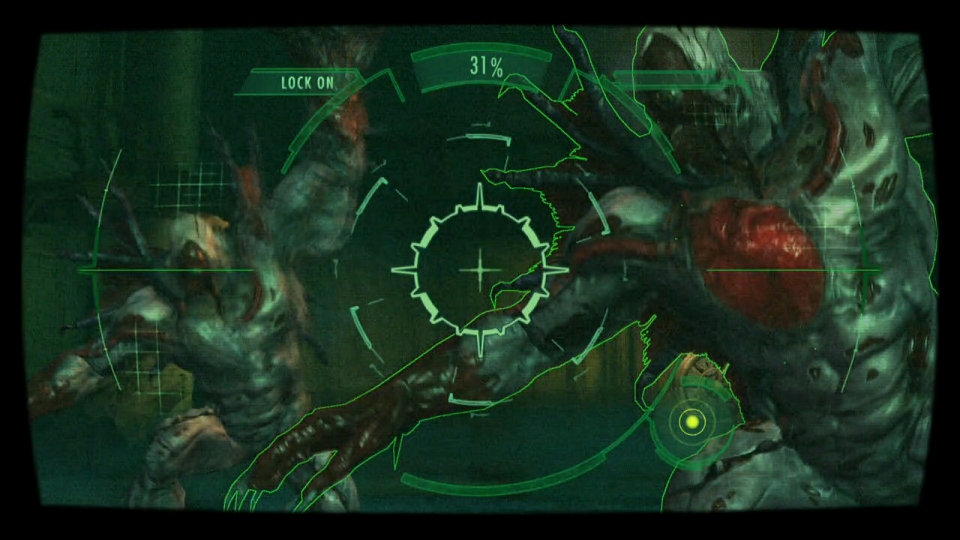
The genesis scanner allows players to scan enemies, handprints, and find hidden items. It also inexplicably spits out an herb when the scan reaches 100%.
But not even that satisfies Revelations. Later still we find out there was a third ship. I wish that were a joke. And worse, the third ship is also pointless because the final battle that takes place there makes no sense. The head of Veltro, souped up on T-Abyss virus and trapped at the bottom of the sea, wants revenge on Morgan and the FBC. He has video proof that could bring down the head of the FBC, so when Jill and Chris show up with the exact same agenda (after fighting a big giant infected sea monster that would serve as a fine final boss in the previous chapter, by the way), he decides not to give it to them. Now the final boss fight may commence with a large bipedal monster that yet again looks like Tyrant from the first game. Phantom of the Opera works for many reasons. For one, the narrative never lies nor does it back down from its conflicts. The mask comes off, and we see the Phantom’s face in the same shot. Revelations would have said it was some other misfigured guy’s face in some other opera house, maybe even in some other city (and maybe there’s three misfigured guys, not just two). But more importantly: we sympathize with the Phantom. We like him. He’s complex. He’s tortured. His wants are beyond his reach, and for that we relate to him much better than that shmuck Raoul who gets everything on a silver platter in typical leading man’s fashion. When the Phantom holds up his fist, we want him to have a deus ex machina to throw down and win even though we know he is the monster, we know he must lose, and we know he must die. But, again, the narrative does not lie. Even as he thrusts his fist up menacingly, we know it cannot be. We know deep in our hearts that he holds nothing, but despite what we know we want him to win. And that’s the key: we want to believe and, by extension, we want to be deceived. 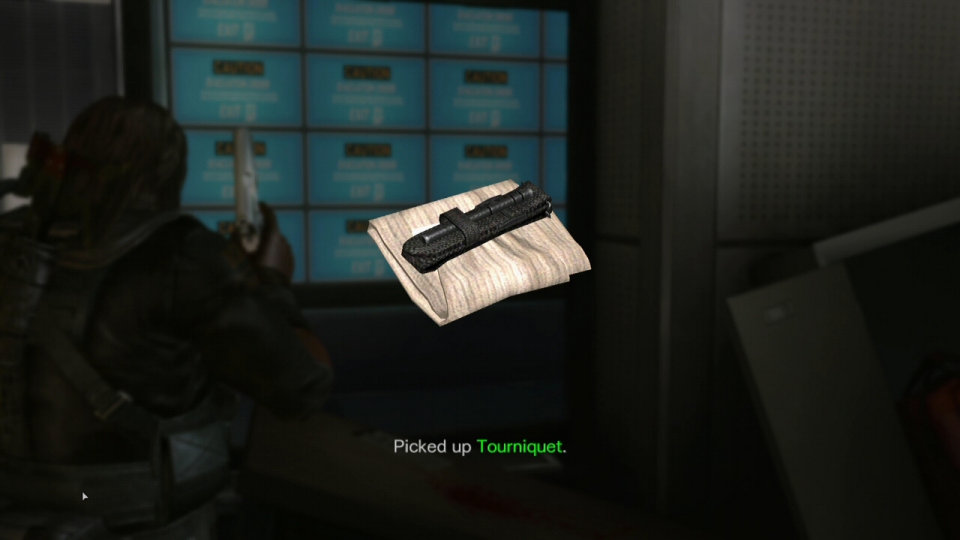
There’s fewer item collection quests and nonsensical puzzles in Revelations which I appreciate, and most of them make more sense than collecting jewels to open a door in a police station.
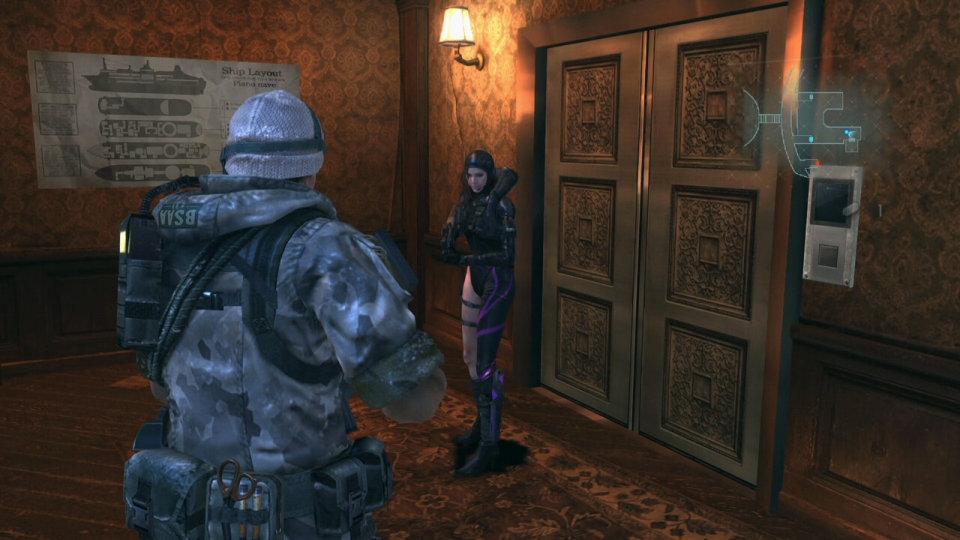
Now, I don’t mind weird exotic outfits in my video games, but Jessica’s purple striped leg-missing wetsuit is one of the most retarded designs I have ever seen. Period.
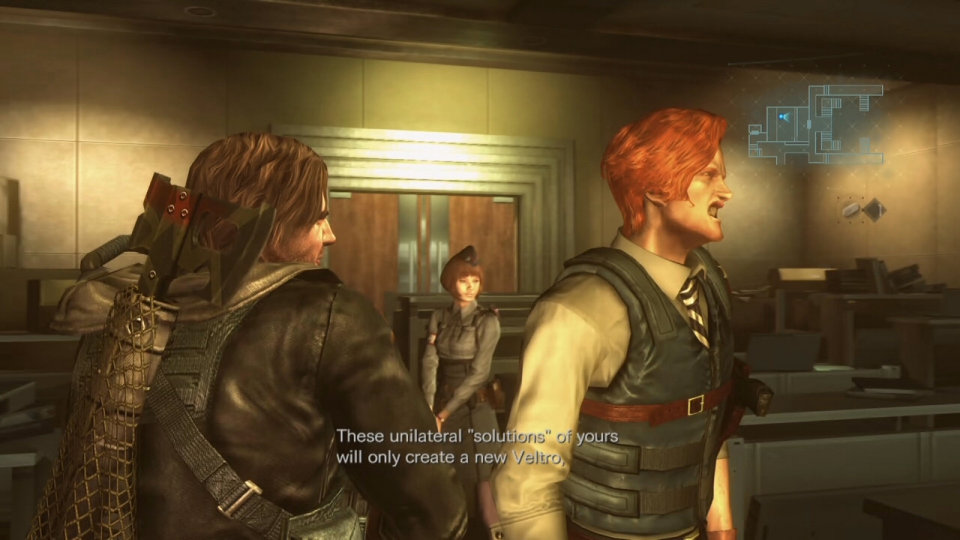
Revelations establishes Raymond, the evil looking snarling red head, as a bad guy by appearances alone, and then it does something genuinely brilliant: it paints him as a good guy shallowly misjudged based on first impressions ... and then Capcom throws it away by making him a bad guy in the post-credits cut scene.
Audiences are smart. You can’t trick them. All you can do is make them want something so badly, that they’re willing to indulge you just for that fleeting sense that maybe, just maybe, they can have the ending they want where the flawed and sympathetic human villain doesn’t have to die at the hands of inhuman machinations of the plot—the perfect goody-two shoe angels. In that sense, it’s really more of a seduction than a deception. There are no sympathetic villains in Resident Evil: Revelations. Only monsters, bigger monsters, and assholes. We instantly sympathize with Jill, Chris, Parker and even O’Brian—all good guys. All are destined to win in a pampering narrative that favors them from the beginning, and we know it. Clear cut. Black and white. No shades of gray. There’s nobody else who can win, and certainly no one we’d secretly want to win. So when Revelations reveals its empty hand for the twelfth consecutive time in as many chapters it feels like a complete waste of time because we’ve known all along this cast of characters can only work for a simple story about simple monsters, simple objectives, and simple bad guys. Period. And by the way, you know what premise doesn’t need help from complications? “Handful of people in a remote location against overwhelming odds.” Plain. Simple. Perfect for this cast. Nevertheless, I like Revelations. I like it a lot. I love the abandoned cruise ship which is hands down the best setting for survival horror. Isolated. At nature’s mercy. Infinite variety. And some of Earth’s creepiest creatures come from the deepest depths of her oceans. I like the third person gameplay with a variety of guns, melee attacks, execution moves, and two dodges allowing players with practice to comfortably deal with anything the game throws at them while the timing and positioning remains tricky and difficult to master which maintains the tension in prolonged fights making this the most capable, balanced, and refined set of RE controls to date. Most of all, I love the immersion: I love slowly walking up stairs, rounding blind corners, and approaching a padlocked door searching for the source of a vaguely human voice parroting his death cries while wondering what terrible monstrosity the virus has turned him into. And in the end, cutscenes and story only take up a small percentage of the overall experience which is why I can thoroughly enjoy the game even if the story is unquestionably unforgiveable garbage. | ||||||||||||||||||||
|
| ||||||||||||||||||||
